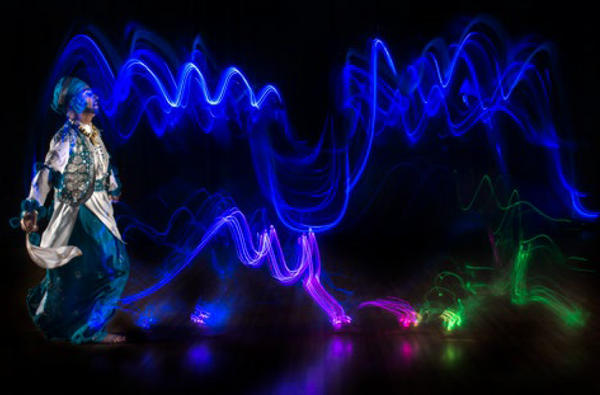Hardeep Sahota: Bhangra Lexicon comes to Yorkshire Sculpture Park





YSP Upper space - 9 January 2021.
Bhangra Lexicon is the world’s first ‘visual dictionary’ of movements found within this beautiful artform, carefully compiled by World Bhangra Day founder, the Huddersfield-based dancer, Hardeep Sahota.
Bhangra is an energetic form of dance and music that originated in the Panjab, by farming communities during the spring harvest festival of Vaisakhi. Its driving force is the Dhol, a large double-sided, barrel-shaped
drum. Sahota has explored, documented and catalogued 300 dance movements and gestures from Bhangra and its sub-genres to create a unique record that gathers together a rich body of knowledge, ensuring its preservation for future generations.
This new exhibition grew out of Sahota’s initial research and gives vibrant visual form to dance movements through the fascinating medium of light painting. Dancers from a number of different disciplines – including
Irish dancing and breakdancing as well as Bhangra – perform key moves whilst holding coloured lights in semi-darkness, so that every nuance of their actions can be traced using long exposure photography.
Sahota collaborated with photographer Tim Smith to create compelling and dynamic images that give physical, even sculptural, form to the fleeting nature of the dance. The flowing movements translate into bright, almost calligraphic strokes. The atmospheric images were taken in the evening at YSP and other locations across Yorkshire.
In images using light painting, the person performing the action typically remains anonymous in the shadows, with the sole focus being on the light. However, Sahota was keen that the costumes and cultural identities of the participants played an equally important role, so they are also illuminated using targeted flash. He describes how the creative collaboration between himself, photographer and dancers is empowering for the participants, working together to enmesh different disciplines and increase understanding of each artform.
Sahota’s academic enquiry to date has examined ephemeral elements of Bhangra moves, the movements or ‘Mudravan’, from the traditional ‘Puratan’ moves and how they correlate with specific Dhol beats, to more contemporary ‘Samakali’ interpretations that have evolved over time. The project’s exploration of
the relationship between movement and image to present a formal ‘repertoire’ of Bhangra steps also acts as an online resource for learners to inscribe into their practice.
While the phenomenon of Bhangra now has a global reach with varied audiences around the world, its history, scope and depth are still not fully appreciated and so cannot be celebrated as they deserve to be. Sahota’s work strives to honour and extol this rich narrative through embedded research, vibrant performance and the meaningful bringing together of performers and communities.
Photo: Tim Smith.